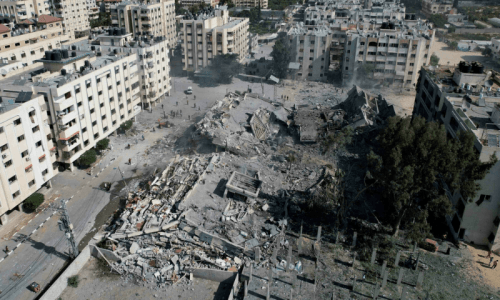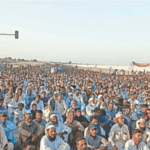GAZA STRIP: As Israel was getting ready to send negotiators to fresh cease-fire talks in Qatar, the health ministry in Gaza announced on Sunday that at least 61 Palestinians had died in an Israeli bombardment that occurred overnight, bringing the total number of deaths to 31,645 persons.
The Israeli prime minister’s office said that the security cabinet and the smaller war cabinet would convene to “decide on the mandate of the delegation in charge of the negotiations before its departure for Doha.”
The statement it released did not say when the delegation was scheduled to depart for the most recent round of negotiations, which follows the submission of a new proposal by Hamas calling for a ceasefire and the release of prisoners.
The Gaza Strip is under terrible humanitarian conditions as a result of more than five months of fighting and an Israeli siege; the UN has warned the 2.4 million people living in this coastal area several times that hunger is imminent.
The impending Israeli attack on Rafah, according to the German chancellor, would make regional peace “very difficult.”
A second ship was scheduled to sail from Cyprus via a new maritime route to deliver food and emergency supplies, but the flow of aid trucks into Gaza has halted, according to Cypriot officials.
The Spanish assistance vessel Open Arms, which had pioneered the sea approach, carried a barge containing supplies, which the US organization World Central Kitchen reported its staff had completed unloading on Saturday.
North Gaza, where inhabitants claim to have resorted to eating animal fodder and where some have assaulted the few relief trucks that have made it through, has proven particularly tough for the UN to access.
Tedros Adhanom Ghebreyesus, the director of the UN World Health Organization, pleaded with Israel not to attack Rafah “in the name of humanity.”
North Gaza, where inhabitants claim to have resorted to eating animal fodder and where some have assaulted the few relief trucks that have made it through, has proven particularly tough for the UN to access.
Tedros Adhanom Ghebreyesus, the director of the UN World Health Organization, pleaded with Israel not to attack Rafah “in the name of humanity.”
Israeli Prime Minister Benjamin Netanyahu is under pressure from within to win the release of Hamas hostages who have been held since the beginning of the conflict. On Saturday, demonstrators in Tel Aviv held signs calling for a “hostage deal now.”
Protester Omer Keidar, 27, stated, “The people… need to demand from their leaders to do the right thing.”
A representative of the Palestinian organization, Hamas, said that the proposal calls for an Israeli departure from “all cities and populated areas” in Gaza during a six-week truce in exchange for increased humanitarian aid.
Aid providers are now using air or sea delivery as the ground situation grows more bad.
However, according to UN agencies, air and sea missions are not a substitute for land delivery. Israeli restrictions have been mentioned by humanitarian organizations as one of their challenges.
The United States, which gives Israel military aid worth billions of dollars, has also become more critical of Netanyahu’s conduct during the conflict.
According to Washington, Israel’s long-awaited assault against Hamas in Rafah cannot be supported in the absence of a “credible, achievable, executable plan” to safeguard Palestinian civilians.
Medical personnel at a clinic in Rafah that treats displaced Gazans and is manned by Palestinian volunteers indicated that the situation there has only gotten worse.
“We have a shortage of drugs, particularly pediatric ones,” stated Dr. Samar Gregea, who was also uprooted from the northern city of Gaza City.
She informed AFP that there were numerous patients at the camp, all of them were malnourished youngsters, and that hepatitis A was “widely present.”
According to her, children need meals high in sugar, such as dates, which aren’t available right now.
Fears of widespread civilian casualties have been raised by Israeli Prime Minister Benjamin Netanyahu’s announcement on Sunday that Israeli troops would carry out a planned ground attack in Rafah, south of Gaza.
In a video published by his office, Netanyahu declared at a cabinet meeting that “no amount of international pressure will stop us from realizing all the goals of the war: eliminating Hamas, releasing all our hostages and ensuring that Gaza will no longer pose a threat against Israel.”
Scholz rejects the Rafah attack strategy
Following discussions with Jordan’s King Abdullah, German Chancellor Olaf Scholz stated on Sunday that a significant number of civilian deaths from an Israeli attack on Rafah would make regional peace “very difficult.”
He stated that during his brief visit to the area later on Sunday, he will use this as one of his primary points of contention while speaking with Israeli Prime Minister Benjamin Netanyahu.
The hastily scheduled negotiations follow Israel’s approval of an offensive plan on Friday against the city on the southern border of the destroyed Palestinian enclave, where over half of its 2.3 million inhabitants are seeking refuge following five months of fighting.
“At this point, it is about making sure we reach a durable ceasefire,” stated Scholz following discussions with Abdullah at his home in the Red Sea resort of Aqaba, Jordan.
“That would allow us to stop such a ground attack from happening.”
When asked if he was willing to put pressure on Netanyahu to avert this kind of attack, Scholz responded, “It is very clear that we must take all necessary steps to ensure that the situation does not worsen.”
“Israel is fully entitled to self-defense. However, it is unlikely that any military activities or measures carried out in Rafah directly endanger the people in Gaza who fled there, the speaker stated.
Regarding whether Germany would respond to a major Rafah offensive by, say, limiting German arms sales to Israel, Scholz did not explicitly respond to a question. Along with the United States, Germany has been one of Israel’s most steadfast allies, continuously backing it.








